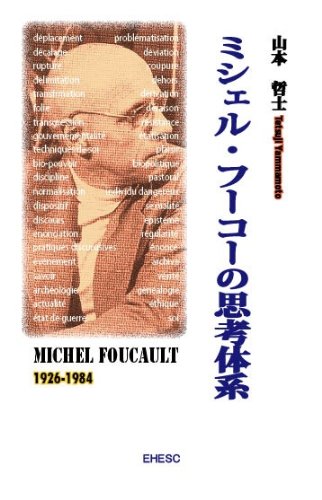フーコーの体系的解説?
図書館で偶然見つけました。530ページもある分厚い本です。当然、狩りてきただけで読み終えるような厚さではありません。ところが、大手の出版社から出されているわけではないので、古本ではあったとしてもとても高いです。
山本さんのYoutubeも観ました。この本と同じく、フーコーの思考体系を「真理/知」「権力/他者」「主体/自己」の「フーコー三角形」と規定していました。
まだ数ページしか読んでいませんが、どうやら、山本さんの注目点は「権力」のようです。もちろん、この三角形は綿密に絡み合い、循環しています。そして、最近の彼の著作のように、「自己」と「知」に関わる「言語」が大切です。権力は、その「自己」や「知」がなければ発生しないのですから。でも、この時点(2008年)では、著者は権力に重点を置いているように思えます。
私は目次を見て、最終章「非自己の述語閾」に興味を惹かれました。
フーコーの翻訳はひどいのか?
著者は、フーコーの邦訳が「ひどい」と言っています。なぜ新装版や引用のときに改訳しないのか、と嘆いています(最近の若い訳者は優秀だとも)。たしかに、フーコーの邦訳本はむずかしいです。それはフーコーの思想の難しさだと思っていたのですが、翻訳のせいでもあるんですね。
新しい思想を紹介する時は、大変でしょうね。それに該当する日本語がないからです。それでも、日本では漢字を組み合わせてなんとか小難しい訳語にしてきた歴史があります(組み合わせるところは、中国語やドイツ語に近いかもしれません)。その小難しさが嫌な若い世代は、だんだん翻訳することをせず、カタカナで発音だけを日本語にする傾向があります。「ディスクール」や「エピステーメ」なんかがそうです。誤訳ではないです。というか、訳していることになるのかなあ。仏教を輸入した中国もそうですね。梵語を中国訳した概念と、梵語の発音をそのまま漢字の読みに当てはめたものがあります。西欧の哲学用語は新しく造られたものもありますが(デリダの「差延 différance」など)、日本語訳では聞いたことのない漢字になっていても、原語は日常的なことばであることが多い気がします(ドイツ語の「Geist」など)。
著者は、フーコーは原語で読まなければわからない、と言います。私もそうおもいます。でも、原語で読めないから翻訳で読んでいるのです。外国語の苦手な私には、すこし努力すれば原語で読めるということではなくて、読むのは「不可能」なのです。翻訳書は原著者と訳者の共作物だと思っています。むしろ、訳者のフィルターを通した原書解釈です。それが、訳者の誤解でも、誤訳でも仕方がありません。
翻訳の可能性は、他者の可能性、そしてそれは「自己の可能性」をかんがえることです。
解説書(入門書)は必要か?
世の中にマニュアルが溢れています。レシピ本も溢れています。解説、要約、索引・・・。車にも取扱説明書がついていますが(読んだことがありますか?)、それを読んだから車を運転できるようになるわけじゃないことは明らかです。
アメリカでは、電子レンジの取扱説明書に「ネコを入れないこと」と書いてあるとか。実際に猫を乾かそうと入れて殺してしまった人が「説明書になかった」と損害賠償裁判で勝ったそうです。そんなのバカみたいと思っちゃいますが、最近の日本製品の説明書を読んでみてください(「ネットで見てくだだい」とQRコードがついているだけのものも多いですが)。
解説書や入門書はそれを書いた人の解釈以外の何者でもありません。本書も、フーコーの著作ではなくて、山本さんの思想をフーコーのことばを材料として書いたものです。フーコーが何をどういう意味で言っているのかを知りたければ、原語じゃなくても原書(の翻訳本)を読むことをおすすめします。山本哲士が何をどう考えているのかを知りたければ、本書はたいへん役に立つでしょう。「述語閾」「非自己」ということは日本人がフーコーを読めば「そっちに進むんだろうな」と思えます。ところがフーコーはそちらにはなぜか進みませんでした。それは、フランス語(SAE、平均的ヨーロッパ標準語の一つ。主語と述語がしっかり対応している)で考えたフーコーの限界かもしれないのです。山本さんは日本語で考えていると思うので、すぐわかることです。
531ページを読むか?
もし、本書が中古で安く手に入ることがあったら、買いたいとおもいます(新品で買っても、内容、量を考えれば安い本です)。ただ、フーコーの原書を読んだ上で、それを深めるために読みたいかな、とおもいます。それに「述語制の日本語」については、山本さんの独立の書があるので、そちらを読みます。
図書館で借りた本は期限があるし(この本を借りる人は殆どいないと思いますが)、線を引くこともできません。付箋を張っただけで、怒られます(笑)。付箋のノリが残って本を痛めるのだそうです。私にとってはこの本は図書館から借りて済む本ではないのです。
Foucault's systematic commentary?
I found it by chance in the library. It is a thick book with 530 pages. Of course, it's not thick enough to finish reading just by hunting. However, it is not published by a major publisher, so even if it is a secondhand book, it is very expensive.
I also watched Mr. Yamamoto's Youtube. Like this book, Foucault's thinking system was defined as the "Foucault triangle" of "truth / knowledge," "power / other," and "subject / self."
I have only read a few pages yet, but it seems that Mr. Yamamoto's focus is on "power." Of course, this triangle is closely intertwined and circulates. And, like his recent writing, the "language" related to "self" and "knowledge" is important. Power does not occur without that "self" and "knowledge." But at this point (2008), the author seems to be focusing on power.
Looking at the table of contents, I was fascinated by the final chapter, "Non-Self Predicate Threshold."
Is Foucault's translation terrible?
The author says Foucault's Japanese translation is "terrible." He laments why he doesn't translate when reprinting or quoting (even younger translators these days are excellent). Certainly, Foucault's Japanese translation is difficult. I thought it was the difficulty of Foucault's thought, but it was also due to the translation.
It will be difficult to introduce a new idea. This is because there is no corresponding Japanese. Still, in Japan, there is a history of combining Chinese characters into difficult translations (the combination may be similar to Chinese or German). The younger generation, who dislike the difficulty, tend to use katakana only for pronunciation in Japanese without gradually translating it. Something like "discourse" or "epi-stem". It's not a mistranslation. Or rather, I wonder if it will be translated. So is China, which imported Buddhism. There is a concept that translates Sanskrit into Chinese, and one that applies the pronunciation of Sanskrit to the reading of Chinese characters as it is. Some Western philosophical terms have been newly created (such as Derrida's "différance"), but the original language is an everyday language, even if it is a Chinese character that has never been heard in the Japanese translation. I think there are many (such as "Geist" in German).
The author says Foucault can only be read in the original language. I think so too. But I can't read it in the original language, so I read it in translation. For me, who is not good at foreign languages, it is not that I can read in the original language with a little effort, but that it is "impossible" to read. I think the translation is a co-production of the original author and the translator. Rather, it is the original interpretation filtered by the translator. It can't be helped by the translator's misunderstanding or mistranslation.
The possibility of translation is to think of the possibility of others, and that is the possibility of oneself.
Do you need a manual (introduction book)?
The world is full of manuals. There are also a lot of recipe books. Commentary, summary, index ... Your car also comes with an instruction manual (have you read it?), But it's clear that reading it doesn't mean you'll be able to drive a car.
In the United States, the instruction manual for microwave ovens says "Do not put cats in". It seems that the person who actually put the cat in an attempt to dry it and killed it won the damages trial, saying that it was not in the instruction manual. I think it's such an idiot, but please read the instruction manuals for recent Japanese products (although many of them just have a QR code saying "Please look online").
A manual or introductory book is nothing more than an interpretation of the person who wrote it. This book is not a work of Foucault, but a writing of Mr. Yamamoto's thought using Foucault's words as a material. If you want to know what Foucault is saying and what it means, I recommend reading the original (translated), even if it is not in the original language. If you want to know what Tetsuji Yamamoto thinks, this book will be very useful. "Predicate threshold" and "non-self" can be thought of as "I wonder if Japanese people will go there" when they read Foucault. However, Foucault did not go there for some reason. It may be Foucault's limit in French (SAE, one of the average European Standards, where the subject and predicate correspond well). I think Mr. Yamamoto is thinking in Japanese, so it's easy to understand.
Do you want to read page 531?
If this book is second hand and you can get it cheaply, I would like to buy it (even if you buy a new one, it is a cheap book considering the contents and quantity). However, after reading Foucault's original book, I think I would like to read it in order to deepen it. Also, regarding "predicated Japanese", there is an independent book by Mr. Yamamoto, so I will read that.
Books borrowed from the library have a limited time limit (though few people borrow this book), and you can't draw a line. Just sticking a sticky note makes me angry (laughs). It seems that the sticky note remains and damages the book. For me, this book is not a book I can borrow from the library.
[著者等(プロフィール)]
やまもと てつじ 1948 年生まれ。 信州大学教授をへて現在東京芸大客員教授。政治社会学、ホスピタリティ環境学。 メキシコへ遊学、イバン・イリイチのもとで産業社会批判を学ぶ。キューバ、メキシコ研究をフィール ドとするも、『ピエール・ブルデューの世界』、『吉本隆明の思想』につぐ本書で、思想家三部作を完成し た理論家でもある。『ホスピタリティ原論』にて新たな学問設計および環境設計を提起。スイス学術財団 EHESC を樹立、ジェネラル・ディレクターをつとめ、ジュネーブといききしながらの国際的な超領域研究 をリードする。著書・編著は50 冊以上、編集雑誌は100冊以上におよぶ。
〈書抜〉(最終章のみ)
「自由プラチックが自らへ向けて行使されうるには、他律技術の支配に対して自己技術を優位化することへ転じる努力をせねばならぬ規制性を、どうしてもわたしたちは破る。自己技術があまりにないためだ。他律技術の自己技術への転移の媒介になるのが、〈非自己〉の技術である。他者の技術ではない、〈非自己〉の技術とは、自己と非自己の非分離の関係における自律的な述語表出を意味する。主体の判断とは別の次元に、述語的意志が表出される。(西田幾多郎の「場所」論)」(P.522)
「非自己の様態がはっきり示されあのは免疫学である。多田富雄は、免疫の考え方が自己の論理から非自己への論理へと転じられたさまを明示する。」(P.523)__不確定性原理を「人生に応用する」という過ちは、いかにして防げるか。
「ラカンが、欲望とは他者の欲望であるといったとき、弁証法的な相互関係をいっているというより、心的な非自己のあり方をいっているというように理解しうる次元がある。自己にオートノミーはない、非自己にオートノミー=自律性があるのだ。」(P.526)
ジジェク『ジジェク自身によるジジェク』
多田富雄『免疫の意味論』『免疫・「自己」と「非自己」』『生命の意味論』
三上章の文法論
「文学とは、非自己の自己表出であるのだ。それは、意識や認識の場にはない、述語閾に開かれているものである。」(P527)__外国文学も、述語制の文化なのか。



